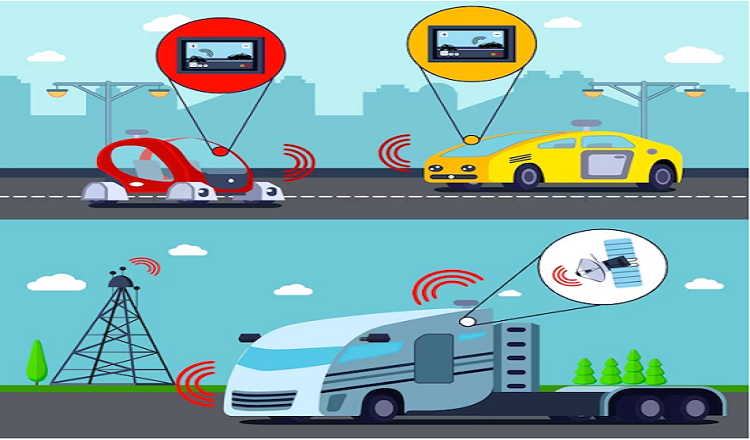Self-driving automobiles, commonly referred to as autonomous vehicles, are rapidly approaching commercial viability. The way we travel is about to change thanks to technological developments and rising investments from major automakers and tech firms. As with any new technology, there are a variety of ethical and security issues that must be taken into consideration.
Imagine this: While you enjoy your morning coffee while seated in your automobile, the vehicle is doing all the driving. No more snarled highways, angry drivers, or inattentive driving. It sounds like the realisation of a dream. Before we go headfirst into this new period, however
The moral conundrum presented by autonomous vehicles
However, the development of autonomous vehicles has raised a number of ethical issues that need to be resolved. Who is accountable in the event of an accident involving a self-driving automobile is one of the most important questions. Is it the maker, the software creator, or the person operating the vehicle? Before driverless vehicles are widely used, these difficult legal and ethical issues must be answered. The bias in the algorithms used to control these cars is another issue. Unfair treatment on the roadways may result from improperly developed algorithms that discriminate against particular groups of individuals. We must address these issues and make sure that autonomous vehicles are operated in an ethical and responsible manner.
Concerns about the safety of autonomous vehicles
Safety is of the foremost importance when it comes to autonomous vehicles. Numerous safety issues, like as these vehicles’ susceptibility to hacking, have been brought up. These vehicles need to be protected from cyberattacks since they contain a lot of sensitive data. The potential for software errors is another issue. What happens if the computer programme that drives the car breaks down? Backup systems must be in place to avoid accidents in these circumstances. Furthermore, as autonomous vehicles proliferate, laws must be put in place to guarantee that they are built, tested, and maintained in accordance with the highest safety standards. To enable the broad use and success of autonomous vehicles, several safety issues must be addressed.
Responsibility for autonomous vehicle accidents
There are numerous legal and moral issues to take into account when it comes to incidents involving autonomous vehicles. In this case, who is in charge? Who is to blame—the car’s maker, the software creator, or the person behind the wheel? To ensure that there is accountability in the event of an accident, these are challenging topics that must be addressed. Regulators will be instrumental in defining safety standards for autonomous vehicles, and it may be necessary to change product liability laws to reflect the new realities of these vehicles. To establish accountability and stop such tragedies from happening again, it is crucial that we answer these questions and identify the parties at fault in accidents involving autonomous cars.
Algorithm bias in autonomous vehicles
Autonomous vehicle control algorithms could be biassed, which would result in unfair treatment of particular racial or ethnic groups. The data used to train the algorithms or the values and beliefs of the software developers are two examples of possible sources for this bias. Unfair treatment on the roadways could result from improperly developed algorithms that discriminate against specific categories of individuals. This is a major issue since it could affect marginalised populations and exacerbate already-existing disparities. We must solve this problem and make sure that algorithms for autonomous vehicles are impartial, open, and fair. This entails taking action to prevent bias in autonomous car algorithms as well as taking into account concerns like data privacy and the impact on marginalised communities.
The advantages of automated vehicles
There is no denying the advantages that autonomous vehicles could have, despite the ethical and security issues that they raise. Since autonomous cars are not susceptible to human error, such as distracted driving or drunk driving, they have the potential to significantly boost road safety. Additionally, they can enhance traffic flow, lessening congestion and saving commuters’ time. Additionally, because autonomous vehicles can be configured to use less fuel and are compatible with intelligent transportation networks, they have the potential to drastically reduce emissions. The potential advantages of this technology cannot be overlooked, even though it’s critical to address the ethical and safety issues involving autonomous vehicles. The key to ensuring the safe, moral, and responsible use of autonomous vehicles is striking the correct balance between these advantages and the issues.
Conclusion
In conclusion, there are numerous and difficult ethical and safety issues related to autonomous vehicles. There are various issues that must be resolved to ensure the ethical and responsible usage of autonomous cars, ranging from ethical concerns regarding fault in accidents to safety worries about hacking and software failures. Another crucial problem that needs to be resolved in order to guarantee the impartiality and fairness of autonomous vehicles is bias in algorithms. Despite these difficulties, there is no denying that autonomous vehicles have the potential to enhance traffic flow, increase road safety, and reduce pollution. It is essential to maintain research and development in this field and to set rules and standards that address the main safety and ethical issues in order to guarantee that these vehicles are used responsibly and ethically. Finding the ideal compromise between the advantages and issues is ultimately what will determine if autonomous vehicles be a beneficial and secure addition to our transportation networks.
Read More You May Like:
- The Impact of AI on Society: Potential Benefits and Risks
- Exploring the Ethics of Artificial Intelligence: The Importance of Responsible AI Development
- AI in retail: how machine learning is changing the way we shop
- AI in Healthcare: How Machine Learning is Revolutionizing Medicine
- AI in Financial Services: How Machine Learning is Transforming Investment and Banking




